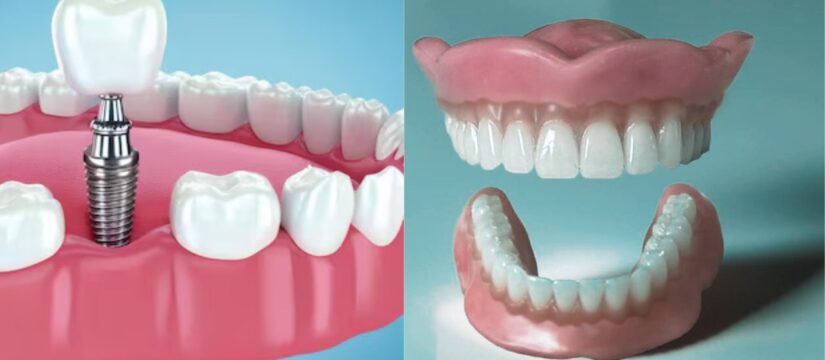
When it comes to restoring your smile, dentures are a popular, effective solution. But if you’re considering dentures, you’ll come across two main types: temporary and permanent. Understanding the differences between these options can help you make an informed decision about what suits your needs best.
Let’s dive into the details to help you determine which is right for you.
What Are Temporary Dentures?
Temporary dentures, as the name suggests, are designed for short-term use. They are often used as an interim solution while you wait for your permanent dentures to be made, or they may be used to allow healing time after tooth extractions. These dentures provide a temporary fix that helps you maintain normal function and appearance during the waiting period.
Key Features of Temporary Dentures:
- Material: Typically, temporary dentures are made from lightweight materials, making them easier to adjust or replace if necessary.
- Ease of Adjustment: Since they’re intended for temporary use, temporary dentures are easier to modify as your gums and jawbone heal and change shape.
- Fast Production: Temporary dentures can be created quickly, often within days of an impression.
- Short-Term Solution: These are not meant for extended use. Over time, they can become uncomfortable or less stable as the gums and jawbone heal and change shape.
Benefits of Temporary Dentures
Temporary dentures serve several key purposes:
- Aesthetic Confidence: Temporary dentures fill the gap left by missing teeth, allowing you to maintain your appearance while waiting for permanent dentures.
- Healing Support: They aid in protecting your gums and jawbone as you heal after extractions or surgery.
- Immediate Functionality: With temporary dentures, you can continue eating and speaking more naturally while you wait for your permanent set.
Temporary dentures are especially helpful for patients undergoing multiple tooth extractions or dental surgery, where healing time is required before permanent dentures can be fitted.
What Are Permanent Dentures?
Permanent dentures are designed for long-term wear and use. Made from high-quality materials, they offer a more stable and durable solution for replacing missing teeth. Permanent dentures can be custom-made to fit your mouth comfortably, and they provide a solution that mimics natural teeth both in appearance and function.
Key Features of Permanent Dentures:
- High-Quality Materials: Permanent dentures are typically crafted from porcelain, acrylic, or composite materials for durability and a natural look.
- Customization: They are carefully customized to fit the unique contours of your mouth, offering a more natural and secure fit.
- Enhanced Stability: Designed to fit snugly, permanent dentures offer better functionality for eating, speaking, and smiling.
- Long-Term Solution: With proper care, permanent dentures can last for years, providing a reliable solution for replacing missing teeth.
Benefits of Permanent Dentures
Permanent dentures provide many advantages, including:
- Durability: Made from strong materials, permanent dentures can withstand daily wear and tear, making them a long-term investment.
- Natural Aesthetics: Custom-made to match your natural teeth, permanent dentures give a realistic appearance, helping you smile with confidence.
- Enhanced Comfort: Because they are tailored to fit your mouth, permanent dentures reduce the risk of slipping or irritation.
- Improved Functionality: Permanent dentures restore your ability to eat a wider range of foods, allowing you to enjoy a balanced diet.
Temporary vs. Permanent Dentures: Key Differences
Here’s a quick breakdown of the primary differences between temporary and permanent dentures to help you understand how each type might serve your needs:
| Feature | Temporary Dentures | Permanent Dentures |
| Material | Lightweight, lower-cost materials | High-quality, durable materials |
| Purpose | Short-term, interim use | Long-term, permanent use |
| Customization | Basic fit, may require adjustments | Customized fit for maximum comfort |
| Production Time | Quick, often within days | Longer, more detailed process |
| Stability | Moderate, may loosen over time | High, secure fit with reduced movement |
| Lifespan | Designed for a few months | Can last several years with proper care |
Maintenance and Care for Both Types
Whether you choose temporary or permanent dentures, proper care is essential to maintain your dentures and ensure oral health.
Caring for Temporary Dentures
- Daily Cleaning: Just like natural teeth, temporary dentures require daily cleaning to remove food particles and bacteria.
- Avoid Hard or Sticky Foods: Since temporary dentures are not as durable, it’s best to avoid foods that could cause damage.
- Regular Adjustments: Temporary dentures may need frequent adjustments as your mouth heals and changes shape.
Caring for Permanent Dentures
- Thorough Cleaning: Permanent dentures need to be cleaned daily to prevent plaque buildup.
- Avoid Certain Foods: While permanent dentures are more durable, it’s wise to avoid overly hard or sticky foods.
- Professional Checkups: Regular dental checkups are essential to ensure your dentures are in good condition and fit properly.
Deciding between temporary and permanent dentures depends on your specific needs, comfort, and budget. Temporary dentures offer a quick, interim solution to help you transition to a permanent set, while permanent dentures provide a long-lasting, durable option that can enhance your quality of life. Consulting with a dental professional can help guide you toward the best option for your smile and lifestyle.
